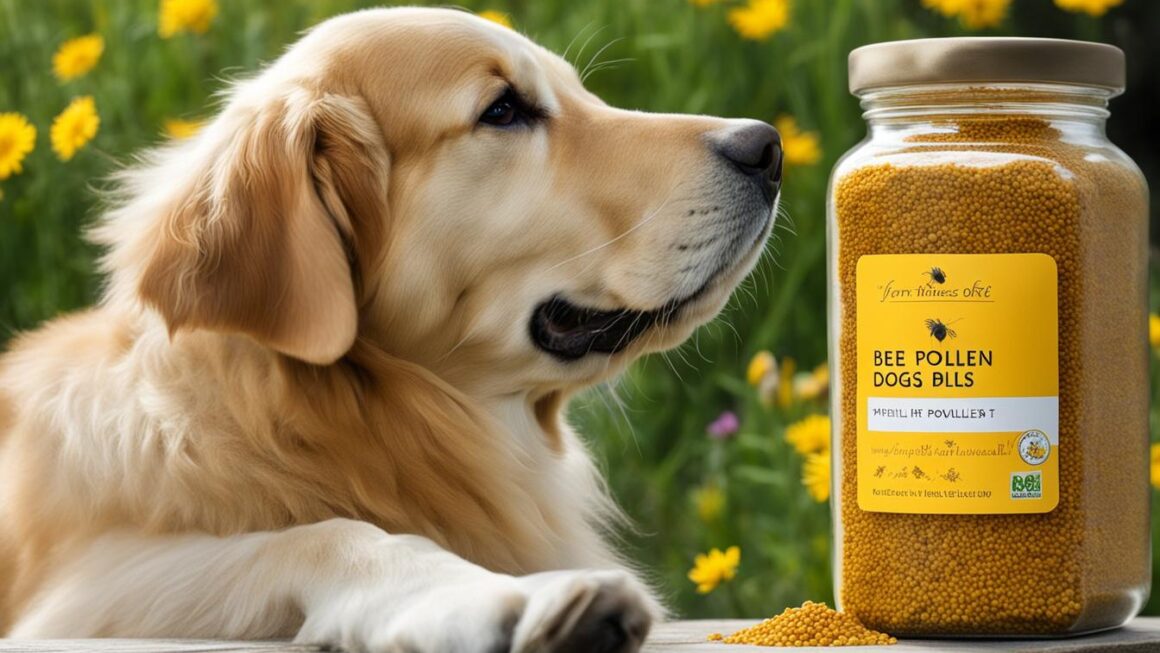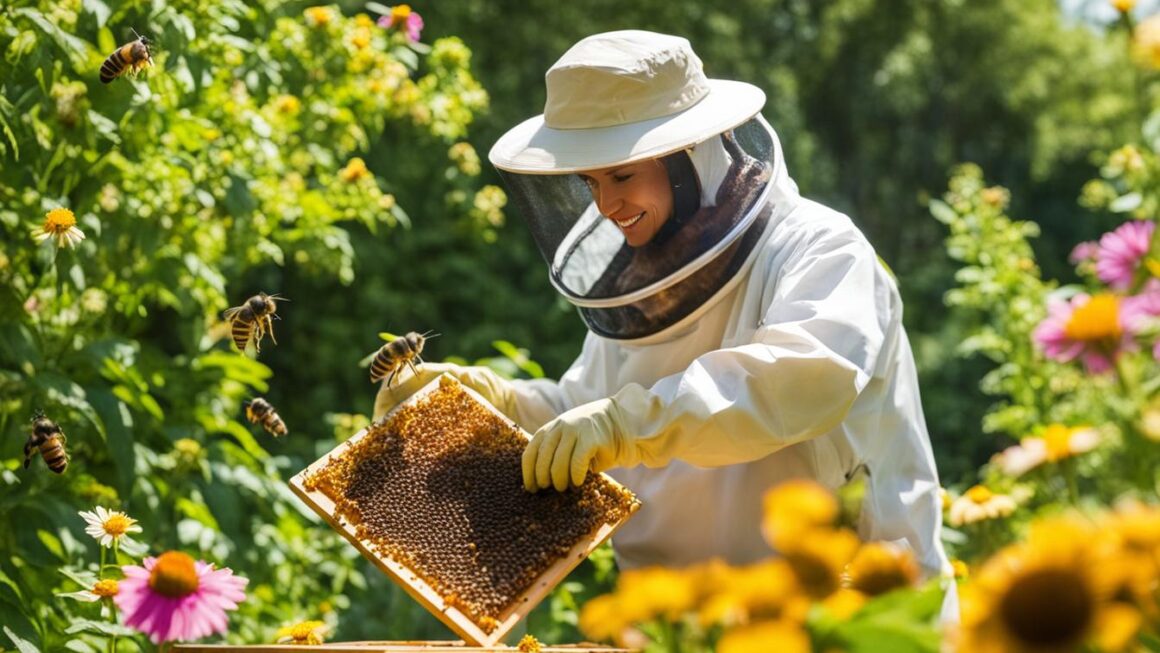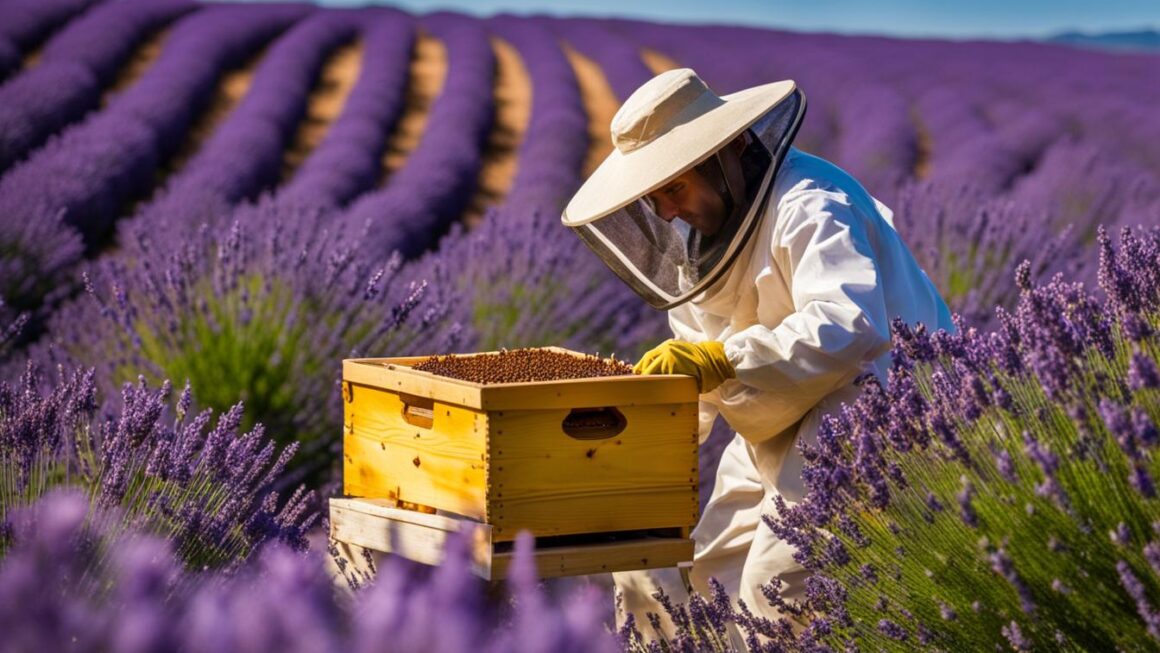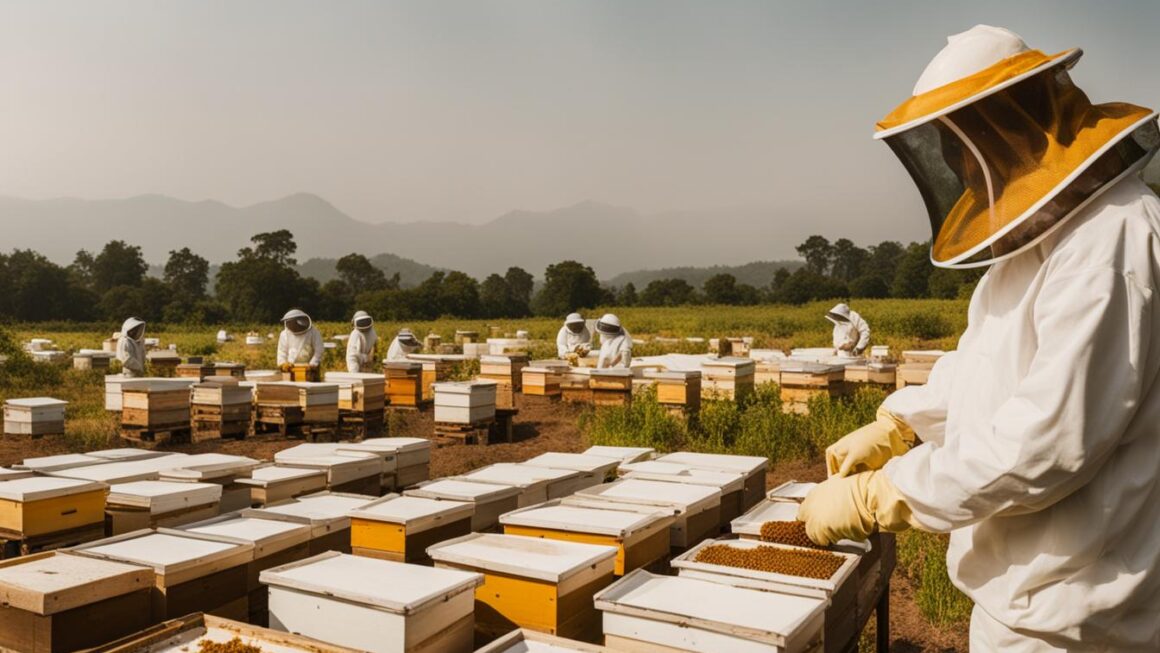Bee pollen is a nutrient-dense supplement that offers numerous health benefits for dogs. It is packed with vitamins, minerals, proteins, and fats, making it a great addition to a dog’s diet. It can support the immune system, improve digestion, promote a healthy liver, boost metabolism, and provide allergy protection. Bee pollen can be added to a dog’s food, with a recommended dosage of 1 teaspoon per day for a 50 lb dog. It is important to choose toxin-free and high-quality bee pollen for maximum benefits.
- Bee pollen is a nutrient-dense supplement that can benefit a dog’s overall health.
- It supports the immune system, improves digestion, and promotes a healthy liver.
- The recommended dosage for a 50 lb dog is 1 teaspoon per day.
- Choose high-quality and toxin-free bee pollen for maximum benefits.
- Consult a veterinarian before adding bee pollen or any other supplements to your dog’s diet.
What is Bee Pollen and Where Does it Come From?
Bee pollen is a natural product that is collected and produced by bees. It is a mixture of pollen grains, nectar, and bee saliva. Bees collect pollen from flowers and carry it back to the hive on their back legs. At the hive, the pollen is stored in cells and mixed with nectar and bee saliva to form the bee pollen that we know.
The quality of bee pollen can vary depending on several factors. The location where the bees gather the pollen, the plant sources, and the weather conditions all contribute to the composition and quality of the bee pollen. It is important to choose bee pollen that comes from a clean and unpolluted source to ensure its purity and avoid any potential contamination.
Bee pollen is a highly nutritious substance that provides numerous health benefits for dogs. It is rich in vitamins, minerals, proteins, and fats, making it a valuable addition to a dog’s diet.
When selecting bee pollen for dogs, it is advisable to look for desert area bee pollen, as it is considered the most sought after due to its purity. It is also essential to choose bee pollen from a reputable source to ensure its quality and safety for your dog. By prioritizing high-quality bee pollen, you can harness its potential benefits and support your dog’s overall health and well-being.
Table: Comparison of Bee Pollen Sources
| Source | Quality | Purity |
|---|---|---|
| Desert Area Bee Pollen | High | Excellent |
| Other Sources | Varies | May be compromised |
Health Benefits of Bee Pollen for Dogs
Bee pollen offers a wide range of health benefits for dogs, making it a valuable addition to their diet. It is packed with antioxidants, vitamins, and minerals that can support the immune system and protect against infections. The fatty acids present in bee pollen can improve the health of the skin and coat, while the enzymes aid in digestion and nutrient absorption.
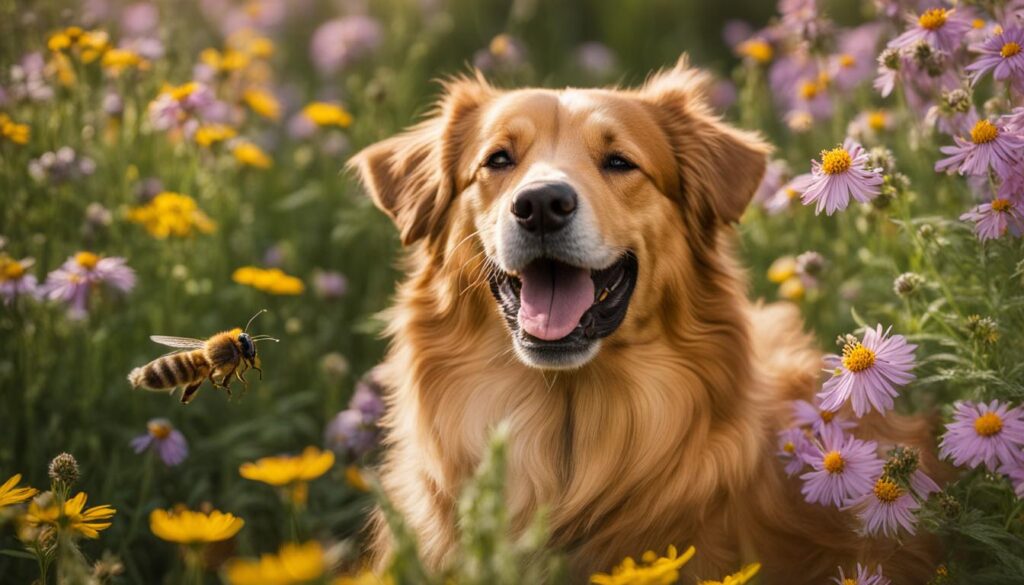
One of the key benefits of bee pollen for dogs is its antimicrobial, anti-fungal, and anti-viral properties. This makes it a natural remedy for certain health conditions, helping to fight off harmful bacteria and viruses. Bee pollen can also improve blood flow, relieving stress and anxiety, and supporting cardiovascular health.
Benefits of Bee Pollen for Dogs:
- Boosts the immune system and provides protection against infections
- Improves skin and coat health
- Aids in digestion and nutrient absorption
- Has antimicrobial, anti-fungal, and anti-viral properties
- Supports cardiovascular health
“Bee pollen is a natural and potent supplement that can enhance the overall health and well-being of dogs.”
It is important to note that while bee pollen is generally safe for dogs, there is a small risk of allergic reactions in some animals. It is recommended to start with a small amount and monitor for any signs of allergies, such as itching, swelling, or difficulty breathing. If any adverse reactions occur, it is best to discontinue the use of bee pollen and consult a veterinarian.
Overall, bee pollen is a natural and potent supplement that can enhance the overall health and well-being of dogs. Its rich nutrient profile, immune-boosting properties, and numerous health benefits make it a valuable addition to a dog’s diet. However, as with any new supplement, it is important to consult a veterinarian before incorporating bee pollen into your dog’s routine to ensure it is suitable for their individual needs.
How to Use Bee Pollen for Dogs
Adding bee pollen to your dog’s diet is a simple and effective way to harness its health benefits. Here are some guidelines on how to use bee pollen for dogs:
1. Start with a small dosage
When introducing bee pollen to your dog, it is best to start with a small dosage and gradually increase it. This allows you to monitor your dog’s reaction and ensure they don’t have any sensitivity to bee pollen. For a 50 lb dog, the recommended starting dosage is 1/4 teaspoon per day. This can be added to their food or mixed into homemade treats.
2. Gradually increase the dosage
After your dog has been introduced to bee pollen and has shown no adverse reactions, you can gradually increase the dosage. The recommended dosage for a 50 lb dog is 1 teaspoon per day. However, it is important to consult with your veterinarian to determine the optimal dosage for your dog based on their specific needs and health conditions.
3. Choose high-quality bee pollen
When using bee pollen for dogs, it is crucial to choose a high-quality product. Look for organic bee pollen sourced from clean and unpolluted areas. Avoid products that contain additives or artificial ingredients. Research the brand and ensure they have a reputation for producing high-quality pet supplements.

| Benefits | Instructions |
|---|---|
| Promotes a healthy immune system | Add 1/4 teaspoon per day to your dog’s food or treats |
| Improves digestion and nutrient absorption | Gradually increase the dosage to 1 teaspoon per day |
| Enhances skin and coat health | Choose high-quality organic bee pollen |
| Provides allergy protection | Consult with your veterinarian for optimal dosage |
“Using bee pollen as a natural supplement for dogs can have numerous health benefits. It is important to start with a small dosage, gradually increase it, and choose high-quality organic bee pollen. Consult with your veterinarian to determine the optimal dosage for your dog based on their specific needs.”
By following these guidelines, you can ensure that your dog receives the maximum benefits of bee pollen while minimizing the risk of any adverse reactions. Remember, every dog is different, so it’s important to monitor their response and consult with your veterinarian if you have any concerns.
Choosing High-Quality Bee Pollen for Dogs
When it comes to choosing bee pollen for dogs, quality is key. It is important to select a product that is sourced from clean and unpolluted areas to ensure its purity and maximize its health benefits. Look for minimal processing methods to preserve the natural nutrients present in bee pollen. Avoid products that contain additives or artificial ingredients, as these can diminish the effectiveness of the supplement. Researching the brand and its reputation for producing high-quality pet supplements is also recommended.
One way to ensure the quality of bee pollen is by checking the ingredient list. The supplement should contain pure bee pollen without any additional fillers or unnecessary substances. It’s also essential to examine the sourcing and harvesting practices of the bee pollen. Choosing pollen gathered from clean and unpolluted areas, such as desert regions, can ensure its quality and minimize the risk of contamination.
When purchasing bee pollen for your dog, consider buying from a reliable source. Local pet stores often carry high-quality bee pollen supplements, or you can explore reputable online retailers. Reading customer reviews and checking for third-party certifications can provide further assurance of the product’s quality and effectiveness. Consulting with a veterinarian before introducing bee pollen or any other supplements to your dog’s diet is always recommended to ensure it aligns with their specific needs and health conditions.
| Key Factors to Consider when Choosing Bee Pollen for Dogs |
|---|
| Purity: Ensure the bee pollen is sourced from clean and unpolluted areas. |
| Minimal Processing: Look for products with minimal processing methods to preserve natural nutrients. |
| No Additives: Avoid supplements that contain additives or artificial ingredients. |
| Reputation: Research the brand and its reputation for producing high-quality pet supplements. |
| Ingredients: Check the ingredient list to ensure it contains pure bee pollen without fillers. |
| Sourcing: Consider bee pollen sourced from clean and unpolluted areas, like desert regions. |
| Reliable Source: Purchase bee pollen from reputable local pet stores or online retailers. |
| Veterinarian Consultation: Seek advice from a veterinarian before introducing any supplements to your dog’s diet. |
By carefully choosing high-quality bee pollen for your dog, you can ensure that they receive all the potential health benefits this natural supplement has to offer. From immune support to digestive aid, bee pollen can be a valuable addition to your pet’s holistic care routine.
Potential Side Effects of Bee Pollen for Dogs
While bee pollen is generally safe for dogs, it is important to be aware of the potential side effects that may occur. Just like with any new supplement or food, there is always a small risk of allergic reactions in some animals. It is recommended to start with a small amount of bee pollen and monitor your dog closely for any signs of allergies or adverse reactions.
If your dog experiences itching, swelling, difficulty breathing, or any other unusual symptoms after consuming bee pollen, it is best to discontinue its use and consult a veterinarian. It is also important to note that bee pollen should not be given to dogs with pollen or bee allergies, as it may trigger a more severe allergic reaction.
It is always a good idea to introduce any new supplement gradually and carefully observe your pet’s response. If you have any concerns or questions about using bee pollen for your dog, consult with a veterinarian who is knowledgeable about holistic pet care and natural remedies for dogs.
| Side Effects of Bee Pollen for Dogs | Symptoms |
|---|---|
| Allergic Reactions | Itching, swelling, difficulty breathing |
| Pollen/Bee Allergies | Possible severe allergic reaction |
Remember, every dog is unique, and their tolerance and sensitivity to certain substances may vary. It is essential to prioritize your dog’s health and well-being by being vigilant and cautious when introducing bee pollen or any other supplements into their diet. By doing so, you can ensure that your furry friend is benefiting from the natural health boost that bee pollen provides.
In the next section, we will explore other bee products that may not be suitable for dogs and why it is important to consult a veterinarian before adding them to your pet’s routine.
Other Bee Products for Dogs
Bee pollen is not the only bee product that can offer potential health benefits to dogs. However, it’s important to note that not all bee products are suitable for canine consumption. Here are a few other bee products commonly found on the market:
Royal Jelly:
Royal jelly is a substance produced by worker bees and fed exclusively to the queen bee. It is rich in vitamins, minerals, and proteins, and is often touted for its potential anti-aging and immune-boosting properties. While some holistic veterinarians may recommend royal jelly for dogs, it is essential to consult with a veterinarian before introducing it into your pet’s diet.
Propolis:
Propolis is a sticky substance that bees collect from tree sap and mix with their saliva. It is used by bees to seal their hives and protect against bacteria and fungi. Propolis is believed to have antimicrobial, antifungal, and anti-inflammatory properties. While propolis may have potential benefits for dogs, it is essential to consult with a veterinarian before using it, as some dogs may be sensitive or have allergies to bee products.
Raw Honey:
Raw honey is a natural sweetener produced by bees from plant nectar. It contains enzymes, antioxidants, and small amounts of vitamins and minerals. Raw honey is often lauded for its potential antibacterial and antiviral properties. However, it is essential to note that not all honey is created equal. Some honeys may be contaminated with toxins or contain high levels of sugar, which can be harmful to dogs. It is important to choose high-quality, raw honey and use it in moderation.
Remember, every dog is different, and what works for one may not work for another. It is always best to consult with a veterinarian before introducing any new bee product or supplement into your dog’s diet. They can provide personalized advice based on your dog’s specific health needs and any existing medical conditions. By taking a holistic approach to your pet’s well-being, you can ensure they receive the best possible care and support their overall health and vitality.
| Bee Product | Benefits |
|---|---|
| Royal Jelly | Potential anti-aging and immune-boosting properties |
| Propolis | Antimicrobial, antifungal, and anti-inflammatory properties |
| Raw Honey | Potential antibacterial and antiviral properties |
Bee Pollen Supplements for Dogs: Top Recommendations
When it comes to choosing bee pollen supplements for dogs, it is essential to select products that are of high quality and sourced from reliable sources. Here are some top recommendations:
Greenbow Organic Bee Pollen: This bee pollen supplement is made from organic bee pollen that is sourced from clean and unpolluted areas. It is minimally processed to preserve its natural nutrients and is free from additives and artificial ingredients. Greenbow Organic Bee Pollen is a trusted brand known for its commitment to producing high-quality pet supplements.
Stakich Bee Pollen Granules: Stakich Bee Pollen Granules are sourced from the highest quality bee pollen. It is collected from diverse areas to ensure a wide range of nutrients. The granules are carefully dried and processed to retain their nutritional value. Stakich prioritizes purity and potency, making it a reliable choice for bee pollen supplementation.
KRUPA CARE Bee Pollen for Dogs: This bee pollen supplement is designed specifically for dogs and is sourced from clean areas known for their high-quality pollen. It is formulated to support the overall health and well-being of dogs, including their immune system, digestion, and skin health. KRUPA CARE Bee Pollen for Dogs is a popular choice among pet owners for its effectiveness.
Finn Allergy & Itch Supplement for Dogs: This supplement combines bee pollen with other natural ingredients to provide relief from allergies and itchiness in dogs. It is carefully formulated to address common allergy symptoms and promote a healthy coat. Finn Allergy & Itch Supplement for Dogs has received positive reviews from dog owners who have seen improvements in their pets’ allergies and overall health.
Before choosing a specific bee pollen supplement for your dog, it is advisable to consult with a veterinarian. They can assess your dog’s individual needs and make appropriate recommendations based on their health and dietary requirements.
Frequently Asked Questions About Bee Pollen for Dogs
As bee pollen gains popularity as a natural supplement for dogs, many pet owners have questions about its usage, benefits, and potential side effects. In this section, we address some frequently asked questions to provide a better understanding of bee pollen for dogs and its role in holistic pet care.
1. Can all dogs benefit from bee pollen?
Most dogs can benefit from bee pollen due to its rich nutrient content and potential health benefits. However, it is important to consult with your veterinarian before introducing any new supplement to your dog’s diet, especially if your dog has underlying health conditions or is on medication. Your vet can assess your dog’s specific needs and determine if bee pollen is appropriate for them.
2. How should bee pollen be stored?
Bee pollen should be stored in a cool, dry place away from direct sunlight to maintain its nutritional value. It is recommended to keep it in an airtight container to prevent moisture and air exposure. Proper storage helps preserve the potency and freshness of bee pollen, ensuring maximum benefits for your dog.
3. Can bee pollen help with allergies in dogs?
While bee pollen is often used as a natural remedy for allergies in humans, its effectiveness for canine allergies is still being researched. Some anecdotal evidence suggests that bee pollen can help dogs with seasonal allergies, but more scientific studies are needed to confirm its efficacy. If you suspect your dog has allergies, it is best to consult with your veterinarian for proper diagnosis and treatment options.
4. Can bee pollen interact with other medications or supplements?
Bee pollen has the potential to interact with certain medications or supplements, so it is essential to inform your veterinarian about any other products your dog is currently taking. This includes prescription medications, over-the-counter supplements, and herbal remedies. Your vet can evaluate the potential interactions and provide appropriate guidance on the safe use of bee pollen alongside other treatments.
| Question | Answer |
|---|---|
| Can all dogs benefit from bee pollen? | Most dogs can benefit from bee pollen, but consult with your vet first. |
| How should bee pollen be stored? | Store bee pollen in a cool, dry place away from direct sunlight. |
| Can bee pollen help with allergies in dogs? | While bee pollen may help with allergies in dogs, more research is needed. |
| Can bee pollen interact with other medications or supplements? | Bee pollen may interact with certain medications or supplements, so consult with your vet. |
Conclusion
Bee pollen is a natural health boost for dogs, offering a wide range of nutrients and potential health benefits. It can be a valuable addition to a dog’s diet, providing support for the immune system, digestion, liver health, and allergy protection. However, it is crucial to introduce bee pollen gradually and monitor for any allergic reactions.
When selecting bee pollen for your dog, opt for high-quality products sourced from clean and unpolluted areas. Look for minimal processing and ensure that the supplement contains pure bee pollen without any additives or artificial ingredients. Consulting a veterinarian before introducing bee pollen or any other supplements to your dog’s diet is advisable to ensure it is suitable for your pet’s specific needs.
Remember, bee pollen is just one of the many natural supplements available for dogs. While it offers numerous benefits, other bee products like raw honey, propolis, and royal jelly may not be suitable for dogs. Each animal species may react differently to different substances, so it’s essential to exercise caution and consult a veterinarian before incorporating any new bee products into your pet’s routine. By prioritizing your dog’s holistic health and well-being, you can help them thrive and live a happy, natural life.
FAQ
Is bee pollen safe for dogs?
Bee pollen is generally safe for dogs, but there is a small risk of allergic reactions. It is important to start with a small amount and monitor for any signs of allergies. Discontinue use if any adverse reactions occur.
How much bee pollen should I give my dog?
The recommended dosage of bee pollen for a 50 lb dog is 1 teaspoon per day. It is important to start with a smaller dosage and gradually increase it to ensure the dog doesn’t have any sensitivity to bee pollen.
How can I incorporate bee pollen into my dog’s diet?
Bee pollen can be sprinkled over the dog’s food or mixed into homemade treats. It is a versatile supplement that can be easily incorporated into a dog’s daily diet.
How do I choose high-quality bee pollen for my dog?
Look for bee pollen sourced from clean and unpolluted areas to ensure its purity. Minimal processing and no additives or artificial ingredients are preferred. It is advisable to research the brand and choose a reliable source.
Are there any potential side effects of bee pollen for dogs?
While bee pollen is generally safe, there is a small risk of allergic reactions in some animals. It is best to start with a small amount and monitor for any signs of allergies. Discontinue use if any adverse reactions occur.
Can I give other bee products, like raw honey or royal jelly, to my dog?
While bee pollen is beneficial for dogs, other bee products may not be suitable. Raw honey, propolis, and royal jelly have different compositions and potential side effects. It is best to consult a veterinarian before adding them to a dog’s diet.
Are there any recommended bee pollen supplements for dogs?
Some recommended bee pollen supplements for dogs include Greenbow Organic Bee Pollen, Stakich Bee Pollen Granules, KRUPA CARE Bee Pollen for Dogs, and Finn Allergy & Itch Supplement for Dogs. It is advisable to consult a veterinarian before choosing a specific supplement for your dog.

